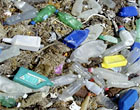Speaking at the recent TED Conference in California, oceanographer Charles Moore ”“ who discovered and publicized the huge oceanic gyre of plastic waste known as the “Great Pacific Garbage Patch” — outlined the toll taken on marine life by plastic bottles and caps. Moore, founder of the Algalita Marine Research Foundation, said that the massive use of plastic bottles — Americans purchase 2 million plastic bottles every 5 minutes — is leading to floating swaths of trash that are killing large numbers of seabirds and contaminating fish. Hundreds of thousands of albatross chicks die in the Pacific every year when their parents pluck bottle caps out of the sea — thinking they are food — and feed them to their offspring, Moore said. As the bottles and caps break down, they turn into plastic pellets that are ubiquitous in the Pacific “garbage patch,” which is twice as large as Texas. One-third of the fish sampled by Moore’s foundation contained plastic pellets in their stomachs, he said, adding that the pellets accumulate extremely high levels of so-called persistent organic pollutants. The solution, he said, is to change the world’s “throwaway culture” and contain plastic waste on land.
Oceanographer Charles Moore Talks About The Pacific Garbage Patch
More From E360
-
Policy
U.S. Push for Greenland’s Minerals Faces Harsh Arctic Realities
-
ANALYSIS
Overshoot: The World Is Hitting Point of No Return on Climate
-
Solutions
In Hunt for Rare Earths, Companies Are Scouring Mining Waste
-
Oceans
Sea Star Murder Mystery: What’s Killing a Key Ocean Species?
-
Solutions
Plagued by Flooding, an African City Reengineers Its Wetlands
-
WATER
After Ruining a Treasured Water Resource, Iran Is Drying Up
-
FILM
At a Marine Field Station, Rising Seas Force an Inevitable Retreat
-
Energy
To Feed Data Centers, Pennsylvania Faces a New Fracking Surge
-
SPACE
Scientists Warn of Emissions Risks from the Surge in Satellites
-
WILDLIFE
A Troubling Rise in the Grisly Trade of a Spectacular African Bird
-
Energy
In Myanmar, Illicit Rare Earth Mining Is Taking a Heavy Toll
-
INTERVIEW
How Batteries, Not Natural Gas, Can Power the Data Center Boom
